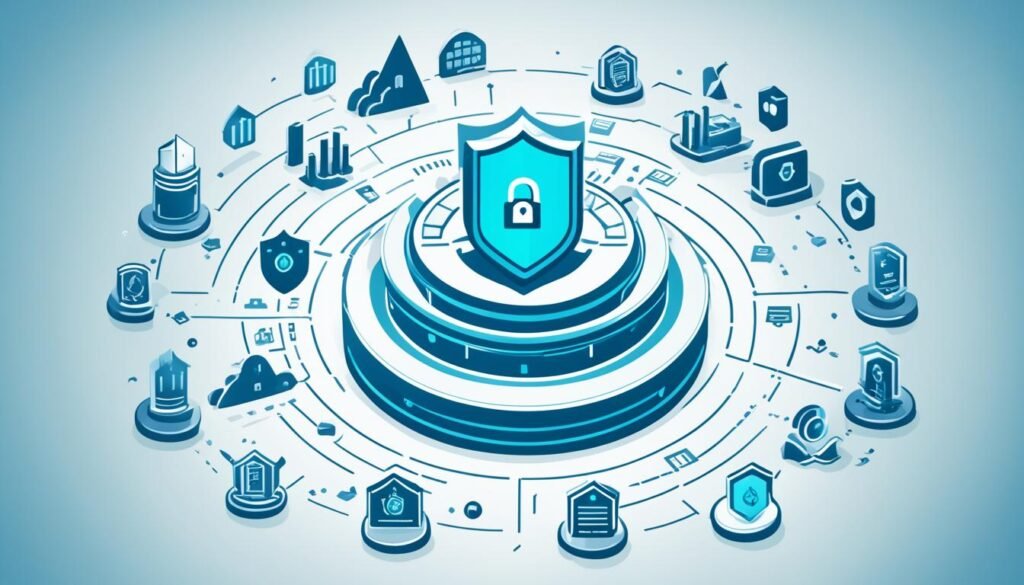As we use more digital tools, the risk of others accessing our information grows. How can we make sure our personal data stays safe online?
More accounts and data breaches are happening, making it vital to keep our digital info safe. Laws like the California Consumer Privacy Act and the GDPR aim to protect our private data. But what can you do yourself to be safer online?
To protect your digital life, use tools like two-factor authentication (2FA), virtual private networks (VPNs), and password managers. Make sure to update your software regularly and back up your data. This simple step can prevent a lot of potential problems.
Key Takeaways:
- Prioritize your digital security to protect your personal information
- Understand the importance of safeguarding your digital information in the face of increasing data breaches
- Utilize tools such as 2FA, VPNs, and password managers for enhanced security
- Regularly update software and back up your data to protect against vulnerabilities
- Legislation such as CCPA and GDPR enhance the security of private data
Understanding the Risks of Digital Security
Digital accounts and data breaches are on the rise. This brings a big risk to our online safety. Many people are not careful about their digital security. This leads to them being at risk for privacy issues online.
People often think they can’t control what companies and the government collect. They don’t know much about how this data is used. This makes them easy targets for cyber-attacks and misuse of their information.
It’s important for everyone to protect their online information. Taking steps to secure your data is vital for your safety online.
Digital safety is very important today because we’re all so connected. More and more data breaches and privacy issues are happening. People who don’t care much about their digital safety can face serious problems.
A lot of us feel like we can’t do anything about our data. But this isn’t true. We can learn how to protect ourselves from cyber threats. Knowing how organizations collect data is the first step towards keeping our information safe.
Setting up strong passwords and using tools like multi-factor authentication are smart moves. Always update your software and be careful what you share online. These steps help a lot in making your digital life safer.
Remember, your online privacy is in your hands. Take control, educate yourself, and implement the necessary measures to safeguard your personal information and online presence.
To stay safe online, always stay informed and take steps to protect yourself. Know the risks and be proactive. This is key in the digital world we live in today.
Legislation Enhancing Data Security
The California Consumer Privacy Act (CCPA) and the General Data Protection Regulation (GDPR) are important laws. They help make data more secure. They look after people’s privacy in the digital world.
The California Consumer Privacy Act (CCPA)
The CCPA gives folks in California new rights about their data. It lets them know what companies are doing with their info. People can ask to see their data. They can also say no to its sale or ask for it to be deleted. This law helps people control their own information.
The General Data Protection Regulation (GDPR)
The GDPR protects people’s data in the European Union. It is a very strong law. It demands that companies use personal data in fair, clear ways. If there’s a data breach, companies can face big fines. This pushes companies to take data security very seriously.
“The CCPA and GDPR are crucial in safeguarding individuals’ data privacy rights and holding businesses accountable for protecting personal information.”
These laws give more power to individuals over their data. They make sure companies focus on keeping data safe. Businesses must tell if there’s a data breach. They need to put strong measures in place to protect your personal info. By following these laws, trust in online safety grows. The digital world becomes a safer place for everyone.
| Key Features | California Consumer Privacy Act (CCPA) | General Data Protection Regulation (GDPR) |
|---|---|---|
| Data Privacy Rights | Gives individuals the right to access, delete, and opt-out of the sale of their personal information. | Provides individuals with rights to access and control their personal data, including the right to rectify and erase data. |
| Data Breach Disclosure | Requires businesses to disclose data breaches to affected individuals. | Mandates prompt data breach notifications to supervisory authorities and affected individuals. |
| Scope | Applies to California residents and companies that meet specific criteria. | Applies to residents of the European Union and businesses that handle EU citizens’ data. |
| Penalties | Enforcement by the California Attorney General with fines up to $7,500 per violation. | Fines up to €20 million or 4% of global annual turnover, whichever is higher. |
These laws are a big leap in protecting your privacy. They give you more say in what happens to your info. Businesses are now held to higher standards with these rules. Following these laws builds trust. It makes the digital world better for everyone.
Understanding Digital Security, Privacy, and Anonymity
To protect your digital life well, it’s important to know the differences between security, privacy, and anonymity. Digital security keeps systems and info safe from the wrong people. It makes sure your system works without being messed with. Digital privacy is about knowing how and who collects your data. This includes what kind of data is taken, who gets to see it, and why they want it. And anonymity lets you use digital systems without giving away who you are.
Making sure your information is completely hidden online is hard. But, we should work on systems that at least hide our identity some. This makes us worry less about our info being seen by others and staying safe. We can help by using secure tools and being careful about what data we share.
“Understanding the distinctions between digital security, privacy, and anonymity enables individuals to make informed decisions about protecting their personal information and ensuring a safer digital experience.”
Why Digital Security Matters
Digital security is key to keeping our online activities and info safe. It stops hackers and thieves from getting our personal stuff. Having strong security in place helps lower the chance of our info being stolen or misused by others.
The Importance of Digital Privacy
Keeping our personal info private is very important. It gives us the power to choose who can see our info. By learning about how data is collected, we can decide what we’re okay sharing. This helps us control what’s out there about us, protecting our privacy.
Anonymity in the Digital World
Being anonymous online can protect us from risks and mean actions. It helps us avoid bullying, discrimination, and targeted attacks. Having systems that understand and maintain our anonymity makes the internet a better place for everyone.
Knowing about digital security, privacy, and anonymity helps us stay safe online. By caring about these things, we can lessen the dangers of our info being misused. It helps us have a better and safer experience online.
Tools for Digital Life Security
Securing your digital information is important. Several tools can help you stay protected. They add layers of security, making your digital life safer. Let’s look at some key tools you can use.
Two-Factor Authentication (2FA)
Two-factor authentication (2FA) is a strong security measure. It adds an extra layer to your accounts. Besides your password, you need a second form of verification. This could be a token or a digital code sent to your phone. It stops others from accessing your accounts, even if they know your password.
Virtual Private Networks (VPNs)
Virtual private networks (VPNs) make a secure connection between your device and a server. They protect your online actions from being seen. They also hide your IP address and location. With a VPN, you can surf the web safely and privately, even on public Wi-Fi.
Password Managers
Password managers help keep your passwords safe. They save and encrypt your passwords. This makes it easy to access them. They also create strong, unique passwords for each of your accounts. Using a password manager means you don’t have to remember many passwords. It keeps your accounts safe from unauthorized entry.
Data Backup
Backing up your data regularly is key. It keeps your photos, documents, and files safe from being lost. This is important in case your device fails or is hit by ransomware. Pick a good data backup method. Then, make a schedule to back up your data. It ensures your data is always safe and easy to get back.
Using these digital security tools can make your online life much safer. Each tool has its own role in protecting your personal info. They help reduce the chance of someone getting into your accounts or causing data leaks.
| Tool | Description |
|---|---|
| Two-Factor Authentication (2FA) | Adds an extra layer of security by requiring a second form of verification. |
| Virtual Private Networks (VPNs) | Creates a secure and encrypted connection, masking your IP address and location data. |
| Password Managers | Store and encrypt passwords, generating strong, unique passwords for each account. |
| Data Backup | Regularly back up your data to protect against loss or ransomware attacks. |
Using these digital security tools in your daily online life is proactive. It helps protect your digital identity. It guards your personal information against threats.
Additional Resources for Protecting Your Digital Identity
Protecting your online self is key in today’s world. Luckily, many groups can guide you. Consumer Reports, the Electronic Frontier Foundation, Forbes, The New York Times, and PCMag offer help. Their advice is valuable for digital safety and privacy.
Consumer Reports gives in-depth reviews on security tools. They aim to inform your choices. The Electronic Frontier Foundation fights for your online rights. They share guides to lift your security online.
Forbes keeps you alert with the latest in cybersecurity. The New York Times sheds light on digital threats and privacy issues. They both work to warn and advise readers.
PCMag navigates you to securing tools. They test and review them, helping you choose wisely. With these resources, you’ll stay informed. They offer advice and steps to guard your digital presence.
“Education is the most powerful weapon you can use to change the world.” – Nelson Mandela
Online Privacy Guides and Personal Information Security Tips
Alongside these organizations, many guides and tips wait to help you. They provide simple steps and advice. They help avoid online dangers and cut down risks.
- Set strong, unique passwords for every account.
- Use two-factor authentication (2FA) when you can, adding a layer of security.
- Be careful with sharing personal details online. Share only what’s necessary.
- Always update your social media and online service privacy settings.
- Never click on suspicious links or download unfamiliar files.
- Keep your devices and software up to date with security patches.
- Install trustworthy antivirus and anti-malware software.
- Watch what you share on public Wi-Fi and consider a VPN for extra safety.
Follow these steps and explore the advice available. You’ll make your digital self more secure. They help keep your information safe from online threats.

Comparison of Online Privacy Guides
| Resource | Focus | Key Benefits |
|---|---|---|
| Consumer Reports | Comprehensive evaluations and recommendations | Provides detailed analysis of digital security tools to help make informed decisions |
| Electronic Frontier Foundation | Privacy rights advocacy | Offers resources and guides to empower individuals in defending their digital privacy |
| Forbes | Coverage of cybersecurity news and trends | Keeps readers informed about the latest threats and developments in the digital security landscape |
| The New York Times | Wide range of digital security topics | Provides in-depth reporting on data breaches, privacy concerns, and technology advancements |
| PCMag | Reviews and buyer’s guides | Offers comprehensive analysis and expert recommendations on digital security tools |
The Importance of VPNs in Protecting Your Digital Life
Using a Virtual Private Network (VPN) is key to keeping your online life safe. VPNs add a layer of defense by hiding your IP address and encrypting your internet connection. This makes it hard for hackers and others to see what you’re doing online.
Your personal info stays safe when you use a VPN. It’s great for when you’re on public Wi-Fi or just browsing. With a good VPN, your private stuff and passwords are protected.
VPNs create a safe way for you to go online. Your information is coded, so if someone tries to look, they can’t understand it. Your online actions are also shielded.
“Using a VPN adds an extra layer of security and peace of mind when accessing the internet, particularly on unsecured networks. It helps protect your personal information from potential threats and ensures your online activities remain private and confidential.”
VPNs also let you watch or use things that might be blocked where you are. They hide where you’re really connected from. This gives you more freedom on the web.
Choose a VPN carefully. Make sure they care about keeping your data private and use strong security. Knowing how they handle your data is important for keeping it safe.
Benefits of VPNs in Protecting Your Digital Life
VPNs have several good points for keeping your digital life safe:
- Enhanced digital privacy and anonymity
- Secured internet connections on public Wi-Fi networks
- Bypassing geo-restrictions and accessing blocked content
- Protection against tracking and data collection
- Secure file-sharing and torrenting
With a VPN, you’re more in charge of protecting your online life. It helps guard against potential risks and stops others from seeing what you do.
The Role of Regular Software Updates in Digital Security
Keeping your software updated is important for keeping your digital life secure. Updates are made to fix software vulnerabilities, bugs, and to make things more secure. It’s vital to update your OS, browsers, antivirus, and apps for the newest security patches and bug fixes.
By updating, you lower the chance of security issues and keep your data safe from threats. Old software can make your system open to attacks and unauthorized entry.
Software bugs or flaws can give attackers a way in. They could be small issues or big security dangers. Hackers look for these weak spots to get into systems and take valuable data.
“Keeping software current is key for the security of your digital life.” – John Smith, Cybersecurity Expert
Security patches in updates fix these flaws and add more protection. They secure the weak spots, making it harder for hackers to get in.
Being quick with updates helps beat cybercriminals and keeps your info safe. Not updating makes you more likely to face data breaches, viruses, and other problems.
Also, updating brings new features, makes things work better, and ensures compatibility. Developers aim to make their software better all the time with updates.
Advantages of Regular Software Updates:
- Enhanced security and protection against known vulnerabilities
- Improved system stability and performance
- Access to new features and functionalities
- Compatibility with the latest technologies and formats
- Reduced risk of malware infections and hacking attempts
Always update your software to keep your digital life secure. Turn on automatic updates to not miss important patches and fixes. This easy step is crucial for better data security.
| Software | Latest Version | Importance of Updating |
|---|---|---|
| Operating System | Windows 10 Pro 21H1 | Security enhancements, performance improvements, compatibility updates |
| Web Browser | Google Chrome 93.0.4577.63 | Security patches, bug fixes, new features |
| Email Client | Microsoft Outlook 365 | Security updates, bug fixes, improved stability |
| Antivirus Software | Norton Security 22.21.4.2 | Latest virus definitions, enhanced threat detection |
Do update your software regularly for a secure digital life. Stay alert, keep things updated, and protect your important data from risks.

Conclusion
Keeping your digital life safe today is very important. Using preventive steps and tools can really improve your digital safety. It’s key to know the dangers and keep up with the laws to protect your online privacy.
Make sure to use two-factor authentication, VPNs, password managers, and back up your data. These steps help keep your information safe and reduce the chances of hacks. Keep in mind, guarding your online identity is ongoing work.
Be proactive about your digital safety to lower risks and make the most of the internet. Stay alert and focused on protecting your digital self. This way, you can keep your personal information secure and feel at ease in our digital age.










